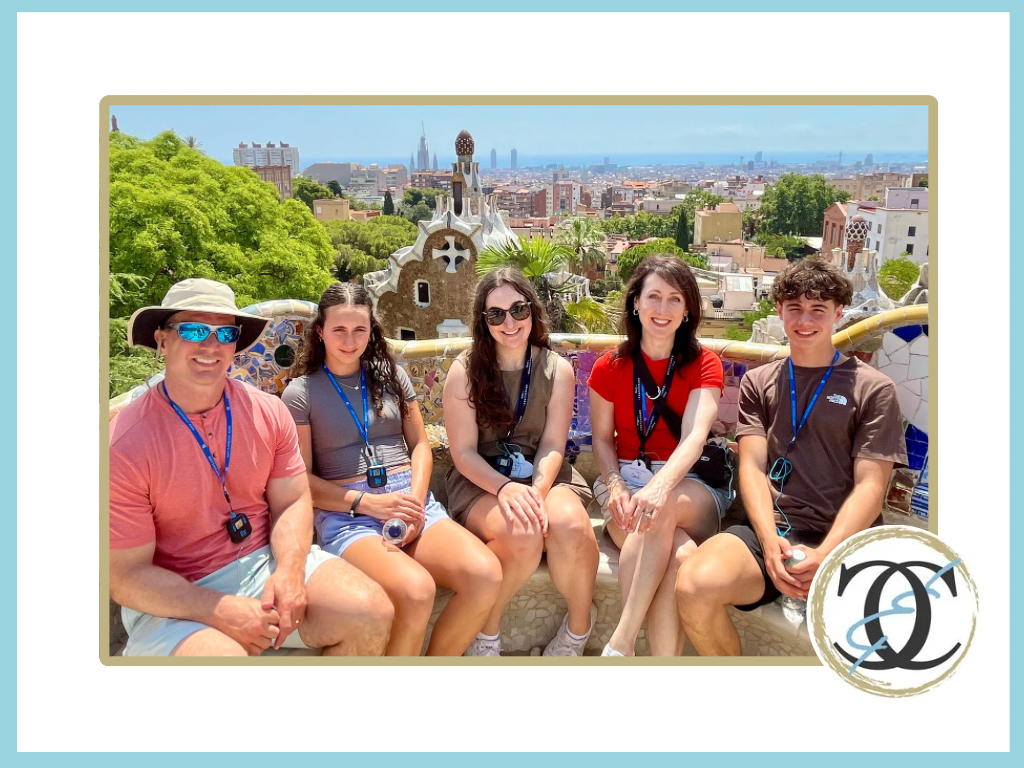How To Create (and Learn From) the Best Family Adventure Vacations
Travel can be one of the best educational tools in your toolbox. Here are 10 tips on how to plan great educational adventures with your family.
As a mom, many of my days are spent checking all those necessary boxes and doing the obligatory things that need done.
Ferrying kids to sports practices? Check!
Helping with math assignments? Check!
Yet, on those lucky days when the to-do list is at a manageable level, maybe you are a little like me and your wanderlust rears its’ beautiful head. And maybe you think about the intentional aspect of parenting. The things beyond the basics of caring for these little humans we have been entrusted to care for. The ways in which you completed the sentence “when I’m a parent” well before you officially took on the title.
And again assuming you and I are practically two peas in a pod (because, after all, you did happen upon my blog in a massive sea filled with lots of blogs), you know that one of the things you want to do intentionally is to ensure your children have loads of memorable experiences that teach and shape them. Experiences that enrich your family through travel and through doing.
But, how do we as parents create educational family adventures that make the most out of our travel dollar and our time away from home? The answers may be more simple than you think.
1. Allow The Kids To Be A Part Of The Trip Planning Process.
As moms, planning and organizing is often our hidden superpower. So handing the reins in this department over to someone else, even partially, can feel a little weird. But one of the best ways to get kids geared up to learn while traveling is to involve them in planning the trip. It’s kind of like the “movie trailer” to your blockbuster of a vacation.
“Pre-trip homework is kind of like the ‘movie trailer’ to your blockbuster of a vacation.”
Need a little inspiration to get you started? Check out Trekaroo´s fantastic destination ideas. Your vacation planning wheels will be spinning with great ideas for trips that suit your family.
2. The Interests Of Your Kids Can Be Your Compass.
We as parents know that our children’s curiosity is a fantastic tool. That’s never more true than when we use travel to learn. And it’s especially true when deciding where to travel.
Have a kid who loves space? The Kennedy Space Center in Cape Canaveral, Florida, the Houston Space Center in Texas or the Smithsonian Air and Space Museum in Washington, DC are great options for traveling and learning. Maybe Civil War history is your child’s passion. National Geographic lists these 10 places up and down the east coast of the United States where kids and adults can relive the war between the north and the south.
In fact, no matter what your child’s interests, there’s sure to be a place or an event that will allow them to experience it as opposed to only read about it.
3. Explore Travel Opportunities With An Open Mind.
One of the great things about travel is the sheer limitlessness of options. There are amazing places to create educational family adventures not only across the globe, but also in our own backyards. That awesome place to see might be somewhere you can tie into a stop on an already planned trip. Or it might be the inspiration for the trip altogether.
“Perhaps travel cannot prevent bigotry, but by demonstrating that all peoples cry, laugh, eat, worry, and die, it can introduce the idea that if we try and understand each other, we may even become friends.” (Maya Angelou)
That was the case for our recent vacation to Iceland. Our older son was fascinated with Viking history and culture. As a kid who responds best to experiential learning, I knew I wanted him to be able to visit some of the places he was reading about. After researching Iceland, I knew it would be a great spot for Viking culture and so much more. Turns out nonstop flights and close proximity to the US also make Iceland an easy and amazing family destination. That’s something I might not have found out had my son’s curiosity not sparked our interest in the destination in the first place.
4. Do Some (Fun) Travel Research Before You Leave The House.
“When you see someone putting on his big boots, you can be pretty sure that an adventure is going to happen.” (Winnie the Pooh)
Even though my four children are vastly unique from one another, they’ve all shared a love of reading book series. They get to know the characters in book series stories and become invested in them.
In a similar way, kids love to visit places they are already invested in too. The vacation is new and exciting yet slightly familiar too. In fact, we’ve been to museums or attractions that we may have otherwise considered mediocre but just the kids’ familiarity with what we’re seeing made it so much better.
So, think of this as your pre-trip homework. Better yet, think of this as the cool big sister of the word “homework” because this homework can actually be fun.
Read engaging books about your vacation destination – historical fiction, books about real-life events that happened there, or biographies about people who define the locale.
Have your child talk to someone whose been there.
Watch movies filmed in or about the locale you’re visiting.
Eat foods that are indicative of the place you’re going.
Make crafts associated with your destination.
Do some internet research. (Follow this link for a helpful travel worksheet kids and parents can use to search the web about the place they’re going.)
5. Overthink Less… And Enjoy Your Trip More.
Researchers and the real experts (moms) know that children often learn the most through observing others. And traveling creates so many opportunities for children to see what the world is like beyond their small corner of it. In fact, some studies are now showing what we as parents already knew – the act of traveling can have direct, positive impacts on school performance and overall learning.
Yet, sometimes when we as parents plan travel with one of the intentions being to expand our children’s horizons, we assume the destination needs to be a place we’ve all read about in books. I’m not suggesting you cross the Grand Canyon, the Statue of Liberty or even the Great Wall of China off your travel list. I am saying travel can be unabashedly, gloriously, fantastically educational …almost anywhere you go.
“Travel can be unabashedly, gloriously, fantastically educational …almost anywhere you go.”
I was reminded of that fact when my family and I took a trip to Bramwell, West Virginia, a town that is not exactly a household name type destination. Yet, in tiny Bramwell my kids saw the place that once housed the most millionaires per capita than any other town in America (thanks to coal money), talked to people who lived through the integration of schools, and met a man who lost half the men in his graduating class in the Vietnam War. And that was just the tip of the learning iceberg in this picturesque, small town destination that I never expected to be so educational.
6. Don’t Be Afraid To Dream Big And Bold When Trip Planning.
I know travel in and of itself is educational. Traveling around the corner or to those easy vacation spots can build fantastic family memories. Yet, in every wanderlust family, traveling to your dream destination is still something that is undeniably extra special.
Making a family adventure destination bucket list can be super fun and inspire the whole family to work toward the goals of getting to those spots. It can also inspire learning just researching which places should go on the list.
And know that more and more families are going places that once seemed difficult to travel to with young children. Travel magazines, sightseeing companies, and, best of all, mom (and dad) bloggers are sharing their secrets to making travel easier for families.
Need to know how to navigate airplane rides with toddlers? The folks at Parents.com interviewed flight attendants to find 12 awesome insights to help make flights with young kids less stressful. Wondering the best ways to save on your dream trip? Read Family Vacation Critic’s guide to getting a great deal on your vacation. Need some pointers on how to pack for traveling with your brood? I love these packing tips from ThePointsGuy.com. There are a plethora of great online resources to make your ideal trip doable.
7. Know Repetition Can Be Your Friend When Planning An Educational Family Adventure.
Do you take an annual trip to see family? Or is there one location you keep finding yourself going back to? Lessons taught through traveling can be found even in those destinations you love revisiting over and over again. These locations can make great educational family adventures. You already know the lay of the land and your favorite reasons for going there. They might just need to be viewed through a different lens than the one you’re used to looking through.
“The real voyage of discovery consists not in seeking new landscapes, but in having new eyes.” (Marcel Proust)
For example, yearly beach trips offer a multitude of learning opportunities. Learn about everything from wildlife on the coast, to the science behind tides, and everything in between. You might even choose to learn history you never knew about the area or take a different route to get there so you can stop at a fun, interesting spot you haven’t visited. The possibilities are limitless and can be tailored to fit the things your kids are excited to learn about.
8. Call In The Travel Experts Once In A While.
Even as someone who loves… adores… lives for planning trips, I can still find the process overwhelming at times. Yet, there’s no reason to reinvent the wheel, especially in the age of Google.
Professional itinerary planning is a growing field. It can take the headache out of figuring out what sights to see on your trip. In some cases, itinerary planning can be free. For example, there’s no charge to use an Authorized Disney Vacation Planner to plan your Walt Disney World or Disneyland vacation. Similarly, itinerary planning is included in some trips, like it was on my family’s trip to St. John on a sailboat charter. Other times, independent itinerary planners can be found by searching blogs and sites about your destination.
“There’s no reason to reinvent the wheel, especially in the age of Google.”
My family and I used a planner for our Iceland trip at a charge of $30 per day, which we spilt with the other family traveling with us. We didn’t include planning for our arrival and departure days, making the planning even more affordable. Our planner knew we were interested in learning about specific things during our time in the country. She provided detailed suggestions for seeing and doing all that we wanted to do. The cost was well worth the help navigating places whose names we couldn’t pronounce and an area we were unfamiliar with.
9. Use What You Learned And Experienced As Travel Inspiration.
I’ve saved the best for last… or at least almost last… because this is the real reason we travel, isn’t it? Travel expounds benefits long after we say “goodbye” to our chosen destination. Beyond the days we’re away from home. Past the time we’re carrying around our passports and cameras.
Travel changes us.
And one of the best ways it changes kids is by sparking their imaginations to learn more about what they see on their travels. It can be the flame that ignites their desire to know more.
“Travel can be the flame that ignites your child´s desire to know more.“
For example, our Costa Rica trip inspired my 6 year-old to learn about volcanos. Our visit to Buckingham Palace in London exposed my 9 year-old to how the US government differs from the British one. Our visit to Mexico fueled my 15-year-old to delve into Mayan history. Even our trip to seemingly un-educational Universal Studios Orlando prompted my 14-year-old to want to learn more about the 1950s thanks to some throwbacks to that era.
While you’re away with the kids, notice, and maybe even journal, what they find most interesting. Spend time talking about what they find fascinating. Trips to gift shops to pick out books and involving the kids in conversations with locals are also great ways to determine what interests your child.
Tap into what you found when you get home. Books are of course a great way to do that but so are projects, crafts, and field trips to local places that are related to what interested your child. And Teachers Pay Teachers isn’t just for teachers but rather it’s a super helpful site for parents to use too when looking for specific projects or learning resources for your kiddos’ chosen interests.
10. Add Travel To Your Homeschool Curriculum (Even If You’re Not A Homeschooler).
Long before I became a homeschooling mom, I had lots of questions about homeschooling. And I was fascinated by the idea of teaching my kids what I thought was important.
Now we’re a family who does a combination of homeschooling and public schooling based upon what we feel is best for our individual kids each school year. And I realize that one of the biggest misconceptions I had about homeschooling was that you have to be a homeschooler to do all of the experiential travel learning that lots of homeschoolers do.
So, I’m letting the secret out! Even if you’re not a homeschooler, you can make travel educational in an organized way.
And if you are a homeschooler, you may even be able to use your travels to meet your child’s social studies curriculum requirement for the academic year. Doing so is one of the things that I’ve enjoyed the most as I’ve homeschooled my kids. Although homeschool requirements vary by state, often the choice of curriculum is up to the parent and tailoring your lesson plans around where you’re going and your child’s interests is possible… and easy.
Related posts:
How do you create educational family adventures with your family? Let us know in the comments section below.















